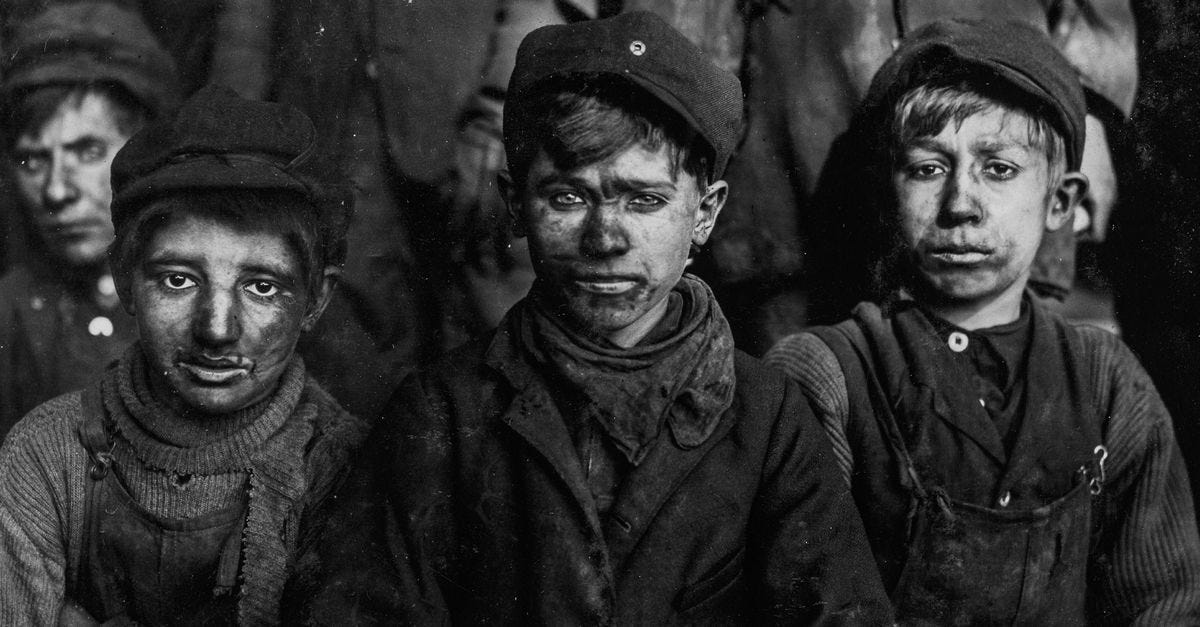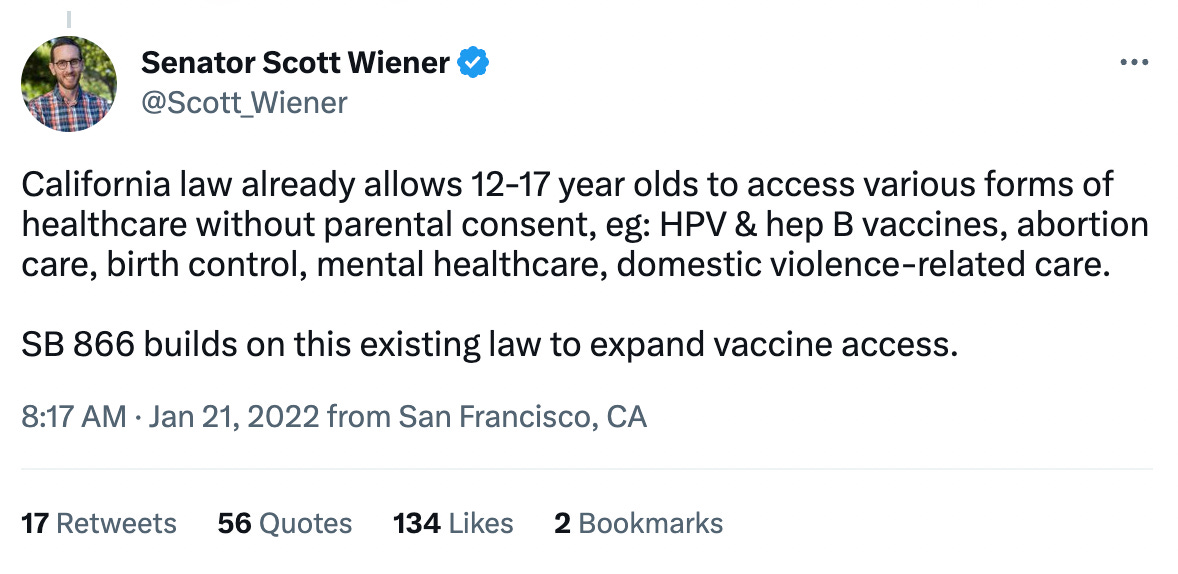Historians of sexual behavior work in context, putting sex into the stream of societal and economic developments. The Second Industrial Revolution made cities much bigger, and pulled people from farms to work in offices and factories, so the sexual behavior of small towns where everybody knew you and knew what you did gave way to the sexual behavior of giant antfarm-equivalent cities where anonymous sex, and commercial sex, became far more common. (Which meant a whole lot of STDs in the late-19th century United States.) A rising standard of living, coupled with a rising average lifespan, changed the meaning of childhood, and the age of consent campaign happened alongside the effort to ban child labor. And the emergence of car culture….well, you know.
So the extraordinary spectacle, this year, of Pride events featuring extensive encounters between young children and adult genitals requires us to ask the usual questions: who, what, when, where, why, and how. (If you doubt that Pride events this year have featured extensive encounters between young children and adult genitals, you can see for yourself. More examples available if you feel like searching for them.) It somehow became widely accepted in the last couple of years that children should see adult strangers naked in the street, or exhibiting their preference for puppy play, because it’s fun and empowering and liberated.
As I’ve written before, what we would now regard as post-pubescent childhood — the lives of young teenagers, physically adult but not yet adult — hasn’t always been cleanly regarded as childhood. In 1880, the age of consent in most U.S. states was twelve, with some outliers setting the age at ten or seven. By 1920, it was sixteen or eighteen nearly everywhere. The idea of childhood changed as the structure of daily life changed through the overlapping processes of industrialization, modernization, and institutional growth. Childhood wasn’t born as a period of innocence; we set it aside as a period of innocence, and regarded it as progress.
But now, progress means that 12 year-olds can avail themselves of what Erica Jong famously called the “zipless fuck,” liberated and casual, with consequences that are easily tossed aside with a curette and a cannula.
I’ll hear other answers, but my own guess is that we’re losing social structure that distinguishes the states and stages of life in a corporatized, financialized, consumerized, atomized, electronically mediated and endlessly state-managed form of existence that increasingly flattens barriers in an effort to make everyone manageable as more or less the same person. eugyppius, this week:
You could say that there is an eagerness to confine human variation to those areas of least concern to the institutional apparatus, and thus to “celebrate,” or actively promote, all those diversities which are of least consequence to the administrative ideal. Modern states actually want highly uniform, undifferentiated populations, and they hope to confine personal expression to sexual, ethnic and consumerist spheres. The Administrative Man may be straight or gay, he may be from any continent; these details hardly matter for the regulators.
Sexualized behavior for children becomes meaningless in a cultural context in which all behavior becomes equally meaningless. Values that assert resistance or difference are atavistic, the “okay, boomer” noise of something quaint. All choices are more or less the same choice. You do some stuff, then you do some other stuff. This is liberation that leaves you on a caged island, chained to your appetites with a credit card and an online ordering form. Scroll back up to Scott Wiener’s tweet and answer this question for yourself:
What’s the trajectory of Scott Wiener’s liberated, sexually active 12 year-old, getting abortions and STD meds and contraception and sutures for sexual partner violence without the impediment of parental knowledge or consent? What is this child’s subsequent adulthood? And do the people who are rebuilding childhood on this model understand the long-term effects on the adult who’s being born in those hypersexualized early years? You can guess my answer.
This brings to me the pseudonymous tradcath writer Peachy Keenan, whose new book was released this month under the title, Domestic Extremist: A Practical Guide to Winning the Culture War. I’ve struggled to form my thoughts on the thing, because in many ways it’s not meant for middle-aged-dad-me. Addressing the reader, it suggests that I avoid having an IUD implanted in my uterus, for example, and I….already wasn’t planning on doing that? Ahem.
But Domestic Extremist speaks to the scarred heart of our broken moment, and it’s an extraordinarily well-timed antidote. A mother in Los Angeles with a background of corporate employment in the culture industries, she arrives with a distinctly personal understanding of the thing she argues against. I figured out today why my first response to the book didn’t quite click: the subtitle is wrong. It’s not a guide to winning the culture war, at least not without some intermediate steps, and it has remarkably little content that looks outside the personal to what we would recognize as the political realm. Rather, it reads to me as a practical guide for young people — particularly young women — to escape the culture of ruin, living well and meaningfully by the substance of their own action. A former advertising copywriter is urging emerging adults to flee from the seduction of commodification, which she identifies as an ironic consequence of later-wave feminism:
Feminism is perhaps the most successful war ever waged on our well-worn human pathways to lasting happiness. The feminist cry to “smash the patriarchy” accidentally smashed the matriarchy instead….
In every way, the term “women’s rights” has been warped and hollowed out, a total misnomer, like one of those hilariously euphemistic government names for bad laws.
Your “right” to be treated equally quickly turned into your “right” to demand an abortion at nine months, your “right” to brag on social media about your lucrative career in socially acceptable sex work, and your “right” to be one of hundreds of jilted girls ghosted by a single male user on Tinder….
Where is the happiness feminism promised them? Where is the thrill that childlessness and no-fault divorce guaranteed?
Seeing the disease of loneliness and hypersexualized social disconnection, Keenan offers the medicine of home, family, meaning, and stability. Maybe the fifth wave is a countermarch.
Read more about the book here.
In any case, look where we are. We see history as linear, falsely, and see “going back” as atavistic regression. But if we took a wrong turn, somewhere behind us, it may not be that at all. I’m going to post the same image twice, as a reminder that this is the world we’re being offered:
It merits a one-word answer, and the word is no.






God, I love your writing! The tidbits in between like the Meatloaf video are perfectly timed and executed. Your insights, and the way you build on them, are spot on.
We definitely took a wrong turn somewhere. I think it was when welfare started and there was no need for the family anymore, according to the government.
With no families, there’s no shame is behaviors, no need to be responsible for your own actions and no one to hold you accountable.